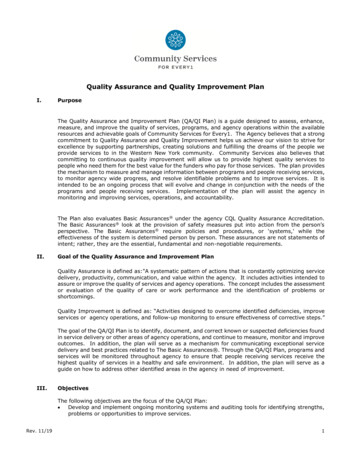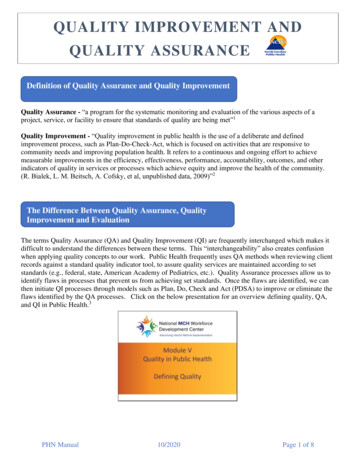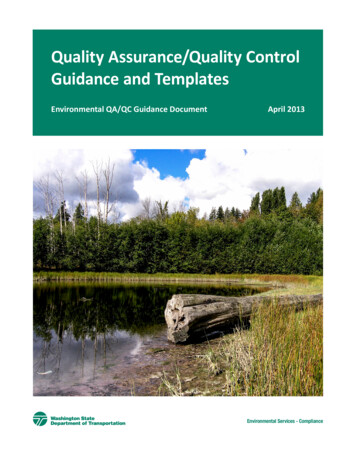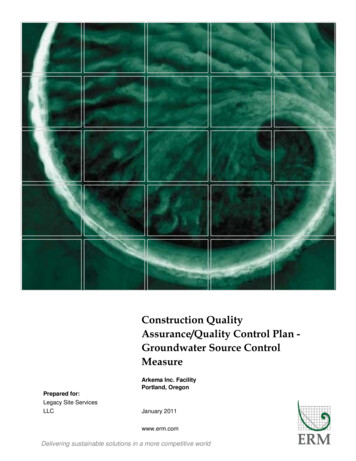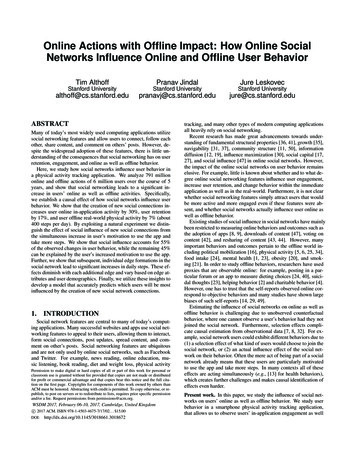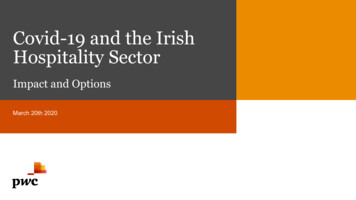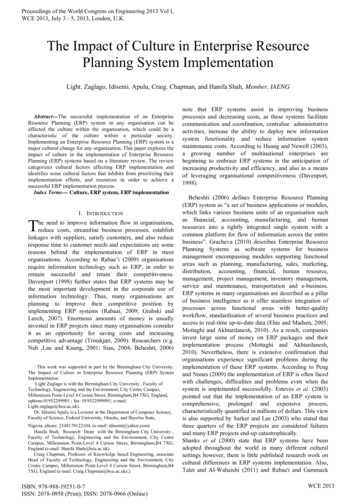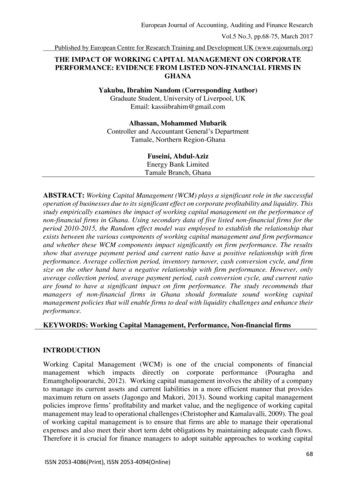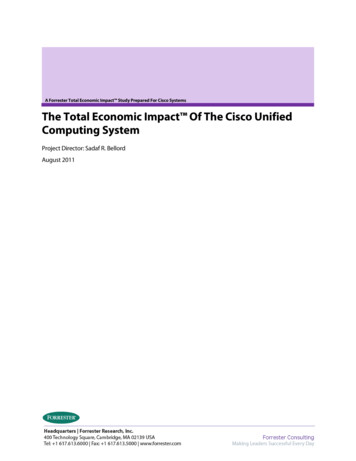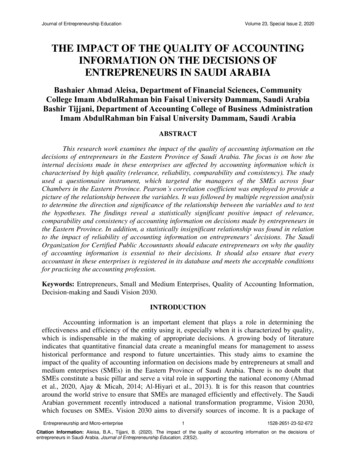
Transcription
Journal of Entrepreneurship EducationVolume 23, Special Issue 2, 2020THE IMPACT OF THE QUALITY OF ACCOUNTINGINFORMATION ON THE DECISIONS OFENTREPRENEURS IN SAUDI ARABIABashaier Ahmad Aleisa, Department of Financial Sciences, CommunityCollege Imam AbdulRahman bin Faisal University Dammam, Saudi ArabiaBashir Tijjani, Department of Accounting College of Business AdministrationImam AbdulRahman bin Faisal University Dammam, Saudi ArabiaABSTRACTThis research work examines the impact of the quality of accounting information on thedecisions of entrepreneurs in the Eastern Province of Saudi Arabia. The focus is on how theinternal decisions made in these enterprises are affected by accounting information which ischaracterised by high quality (relevance, reliability, comparability and consistency). The studyused a questionnaire instrument, which targeted the managers of the SMEs across fourChambers in the Eastern Province. Pearson’s correlation coefficient was employed to provide apicture of the relationship between the variables. It was followed by multiple regression analysisto determine the direction and significance of the relationship between the variables and to testthe hypotheses. The findings reveal a statistically significant positive impact of relevance,comparability and consistency of accounting information on decisions made by entrepreneurs inthe Eastern Province. In addition, a statistically insignificant relationship was found in relationto the impact of reliability of accounting information on entrepreneurs’ decisions. The SaudiOrganization for Certified Public Accountants should educate entrepreneurs on why the qualityof accounting information is essential to their decisions. It should also ensure that everyaccountant in these enterprises is registered in its database and meets the acceptable conditionsfor practicing the accounting profession.Keywords: Entrepreneurs, Small and Medium Enterprises, Quality of Accounting Information,Decision-making and Saudi Vision 2030.INTRODUCTIONAccounting information is an important element that plays a role in determining theeffectiveness and efficiency of the entity using it, especially when it is characterized by quality,which is indispensable in the making of appropriate decisions. A growing body of literatureindicates that quantitative financial data create a meaningful means for management to assesshistorical performance and respond to future uncertainties. This study aims to examine theimpact of the quality of accounting information on decisions made by entrepreneurs at small andmedium enterprises (SMEs) in the Eastern Province of Saudi Arabia. There is no doubt thatSMEs constitute a basic pillar and serve a vital role in supporting the national economy (Ahmadet al., 2020, Ajay & Micah, 2014; Al-Hiyari et al., 2013). It is for this reason that countriesaround the world strive to ensure that SMEs are managed efficiently and effectively. The SaudiArabian government recently introduced a national transformation programme, Vision 2030,which focuses on SMEs. Vision 2030 aims to diversify sources of income. It is a package ofEntrepreneurship and Micro-enterprise11528-2651-23-S2-672Citation Information: Aleisa, B.A., Tijjani, B. (2020). The impact of the quality of accounting information on the decisions ofentrepreneurs in Saudi Arabia. Journal of Entrepreneurship Education, 23(S2).
Journal of Entrepreneurship EducationVolume 23, Special Issue 2, 2020social and economic policies that are designed to free the Kingdom of Saudi Arabia (KSA) fromdependence on oil exports and to build a prosperous and sustainable economic future by focusingon the country’s strength and policies (Vision, 2030). At present, 950,000 SMEs are registered inthe Kingdom for business purposes, and these provide Saudis with employment opportunities(Jadwa, 2019). The number of SMEs operating in the Kingdom suggests that they play asignificant role in its economy. A number of studies have been conducted on the effect of qualityof accounting information on the decision-making process; most of these studies have focusedmainly on large quoted companies (Odar et al., 2015; Awadh et al., 2016; Dabash, 2016; Zugbi,2016; Altayeb et al., 2017; Boqandora, 2017; Budairi, 2017; Heidhues & Patel, 2019; Al-Matariet al., 2013). To date, and to the best of the authors’ knowledge, no published studies havecomprehensively examined the role of the quality of accounting information in decision makingby entrepreneurs at SMEs in Saudi Arabia, or even in Gulf countries. Against this backdrop, thecurrent research work seeks to explore the impact of the quality of accounting information ondecisions made by entrepreneurs. The remainder of this paper presents the survey results in anumber of different sections. In particular, Section 2 presents a brief review of the literature.Section 3 describes the methodology of the study. Sections 4 discusses the results obtained fromthe survey, and section 5 concludes the paper.LITERATURE REVIEWThis paper is guided by the agency, stakeholder and institutional theories. However, theagency theory is considered to be most relevant to this study, since it is based on the relationshipbetween one party (the principal) who delegates the work to another party (the agent). In thiscontext, the owners of the business are considered to be the principals, and the managers are theagents. The agent is mainly responsible for making decisions on behalf of the owner based on theavailable accounting information. Accounting information quality is directly related to thedecision-making process; as a result, poor information quality may have adverse effects on thequality of those decisions (Huang et al., 1999; Gómez-Guillamón & Vidal, 2008, Karilainen etal, 2014). For example, Bowen (1993) argued that an error in an inventory database may causemanagers to make incorrect decisions, resulting in over-stocking or under-stocking, which couldhave a severe impact on company profitability and customer satisfaction. Accountinginformation quality is represented by four attributes that are shown in the hierarchy of qualitiesdescribed in Figure 1 (Dabash, 2016). These attributes reflect four qualitative characteristics ofaccounting information that serve as a basis for decision making (Abohashish, 2005; Dabash,2016, Shields, 1998): the primary qualities of relevance and reliability and the secondaryqualities of comparability and consistency. These qualities make accounting informationunderstandable and useful for decision and reporting purposes. The attributes of accountinginformation quality described in Figure 1 help decision-makers to assess past and future events(Abohashish, 2005; Ali, 2011; Saunders & Robinson, 1989). Relevance of accountinginformation means that there is a close relationship between the information derived fromfinancial accounting and the purposes for which it was prepared (Shubair, 2006; Obaidat, 2007;Budairi, 2017, Beest & Braam, 2006). The role of relevant accounting information in effectivedecision making has received the attention of several researchers. For example, Obaidat (2007)document that financial data are relevant to investors, creditors, and other stakeholders only ifthey are capable of making a difference in a decision (Hyndman & Connolly, 2011; Farag, 2011;Rich, 2017, Shanks & Darke, 1998).Entrepreneurship and Micro-enterprise21528-2651-23-S2-672Citation Information: Aleisa, B.A., Tijjani, B. (2020). The impact of the quality of accounting information on the decisions ofentrepreneurs in Saudi Arabia. Journal of Entrepreneurship Education, 23(S2).
Journal of Entrepreneurship EducationVolume 23, Special Issue 2, 2020Source: (Obaidat, 2007; Dabash, 2016; and Boqandora, 2017)FIGURE 1QUALITATIVE CHARACTERISTICS OF ACCOUNTING INFORMATIONObaidat (2007) argued that reliability in accounting information means that it isverifiable, faithfully represented, and is reasonably free of errors and bias. Palazuelos et al.,(2017) provide a compelling argument for the link between reliable accounting data and rationaldecision making. Using a sample of 471 bank loan officers in Spain, and structural equationmodelling, the authors conclude that perceived accounting information quality has a positiveimpact on trust. Odar et al., (2015) conducted a survey on some selected Slovenian companiesand found that financial statements are useful if they are characterized by several attributes,including integration and timeliness. Some researchers have studied the relationship between thecomparability of accounting information and decision making (Osborne, 2010; Jayasinghe et al.,2015; Xing & Yang, 2018). Xing & Yang (2018), for example, used beta as a measure of riskamong companies listed in the Compustat and CRSP databases from 1962 to 2012. Theyemployed regression analysis to measure the impact of comparable accounting information onsystematic risk. They found that accounting information quality is a sufficient and necessarycondition for reducing exposure to systematic risks. Xu (2003, 2009) developed a framework forlinking the relationships between data quality in accounting information systems and stakeholdergroups, such as information managers, information users, internal auditors and informationproducers. The study found that quality of accounting information can be estimated by fourdimensions: accuracy, timeliness, completeness and consistency. Ballou et al., (1993) identifiedconsistency as a dimension that takes place when the representation of the data values is thesame in all cases. Similarly, Budairi (2017) revealed that there is a positive relationship betweenquality of accounting information, and the level of decisions quality in his empirical study on ofselected companies in Iraq. Lack of quality in information may have negative effects on decisionmaking (Huang et al., 1999). For instance, Bowen (1993) believed that any mistake in anEntrepreneurship and Micro-enterprise31528-2651-23-S2-672Citation Information: Aleisa, B.A., Tijjani, B. (2020). The impact of the quality of accounting information on the decisions ofentrepreneurs in Saudi Arabia. Journal of Entrepreneurship Education, 23(S2).
Journal of Entrepreneurship EducationVolume 23, Special Issue 2, 2020inventory database may lead managers to take wrong decision, resulting in over-stock or understock, which lead to great impact on the company profitability and customer satisfaction. Thisview was supported by Klein (1998) who suggests that errors that are stored in the organizationdatabase, would ultimately lead to poor decisions. Similarly, Redman (1992) reveals that theorganization competitive success may adversely be affected by inaccurate and incomplete data.Decision making is the heart of administration, which is the starting point for allactivities, relationships and interactions with the external environment (Simon, 1997; Farag,2011). Moreover, the cessation of decision making and actions that take place inside anorganization, whatever type, lead to business obstruction, as the importance and gravity ofdecisions increases as the size of the organization becomes larger, and its activities become morediversified and more in contact with the public (Danos et al., 1989; Kanaan, 1998; Al-Dalabih,2018). The decision-making process is directly related to management functions, such asplanning, organizing, directing and controlling, that take place in each level or activity of anorganization (Kyari, 2020). The current study is aimed at determining the link betweenqualitative characteristics of accounting information (relevance, reliability, comparability andconsistency) and the decisions made by entrepreneurs in Saudi Arabia. To do this, the studypresents the following hypotheses.HypothesesH1: Relevance of accounting information has no significant impact on the decisions made by entrepreneursin the Eastern Province of Saudi Arabia.H2: Reliability of accounting information has no significant impact on the decisions made by entrepreneursin the Eastern Province of Saudi Arabia.H3: Comparability of accounting information has no significant impact on the decisions made byentrepreneurs in the Eastern Province of Saudi Arabia.H4: Consistency of accounting information has no significant impact on the decisions made byentrepreneurs in the Eastern Province of Saudi Arabia.METHODOLOGYThis research is explanatory in nature, as it aims to explain and identify the relationshipbetween the quality of accounting information and decisions made by entrepreneurs in theEastern Province. The population of the study comprises of all the SMEs operating in the EasternProvince; the data which was obtained from the four Chambers in the Eastern Province reveals atotal of 39,160 enterprises as at December 2019 (see Table 1). A questionnaire was developed bydrawing on instruments that were used in previous studies of quality of accounting information.The questionnaire targeted the managers of 500 SMEs across the four Chambers in the EasternProvince. Questionnaire links were distributed to the targeted sample through email andWhatsApp contacts (on April 15, 2020) provided by the four Chambers in the Eastern Province.The fieldwork relating to this survey was conducted over an 11-day period. A total of threereminders were sent. Different scales were used to construct the questionnaire. For example, anominal scale was employed mainly in the first part of the questionnaire to obtain backgrounddetails of the participants. A five-point Likert scale was employed in the second part of thequestionnaire where respondents were asked to indicate their agreement (from “Stronglydisagree” to “Strongly agree”) with statements about the variables of the study.Entrepreneurship and Micro-enterprise41528-2651-23-S2-672Citation Information: Aleisa, B.A., Tijjani, B. (2020). The impact of the quality of accounting information on the decisions ofentrepreneurs in Saudi Arabia. Journal of Entrepreneurship Educat
information quality is represented by four attributes that are shown in the hierarchy of qualities described in Figure 1 (Dabash, 2016). These attributes reflect four qualitative characteristics of accounting information that serve as a basis for decision making (Abohashish, 2005; Dabash, 2016, Shields, 1998): the primary qualities of relevance and reliability and the secondary qualities of .

